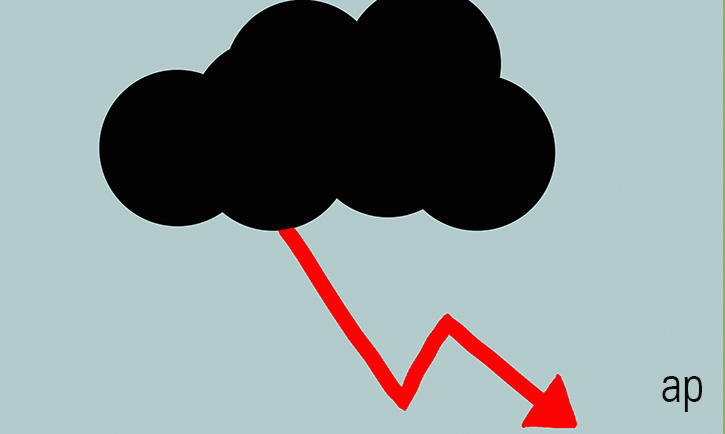
January’s spike in market volatility came after a fairly benign 2021 for stocks, reminding investors that what goes up sometimes also comes down. Whether this is a long-expected collapse or just a wobble is hard to tell at this juncture. What a market correction does do is offer opportunities for short sellers, who bet on the prices of share prices falling.
There have been plenty of heavy one-day falls in recent trading sessions, especially in the US, where Peloton (PTON) and Netflix (NFLX) have plunged on negative newsflow. In UK we’ve seen some strong price moves in individual stocks, not least at The Hut Group (THG), whose shares are down 40% so far this year after a precitipous decline in 2021.
Handily, the Financial Conduct Authority (FCA) produces a daily list of the most shorted stocks. This dynamic list gives an insight into what professional investors think about particular sectors, and sometimes gives an early warning sign of a company in trouble. That could be helpful to retail investors if they’re looking to sell out of an underperforming stock.
The list shows changes in sentiment towards certain sectors: oil shares were heavily shorted in 2020, for instance, but the latest rebound means they have dropped out of the main list.
Cineworld Stays Top
Last time we looked at this list in detail was three months ago, when world markets were less skittish, and fears about inflation and interest rate rises from central banks seemed more distant. Cinema operator Cineworld (CINE) was the most shorted stock in October, and it remains so at the end of January 2022, with nearly 9% of its shares being shorted, higher than three months ago.
Cineworld's shares did have a strong start to 2022, with a gain of 25% in January as fears over the Omicrom variant have started to fade and the end of further restrictions appeared on the horizon. But shares are still 44% lower than they were this time last year.
Russian gold miner Petropavlovsk (POG), meanwhile, remains in second place with just over 6% of its shares shorted. The company’s value has fallen 50% in a year amid management changes and production issues, and shares are down 20% since the start of 2022 alone.
Real estate investment trust (REIT) Hammerson (HMSO) is an anomaly among the most shorted shares list because it has rallied more than 80% in a year, a painful proposition for those betting on a fall in the share price. The company invests in commercial property like shopping centres, which was not a great place to be positioned during the 2020 lockdown period, but the return to “normality” (of sorts) has provided a fair wind.
Away from the top three slots, there are some new entrants to the top 10 and consumer exposure is a key theme for five of them. White goods retailer AO World (AO.) is in at number four with nearly 6% of the shares shorted after a bruising 67% fall over the year. Naked Wines (WINE) is in the number four slot in the list with 4.61% of its shares shorted.
Shares have been under pressure for a few months now as drinkers start to ditch their lockdown habits and return to pubs and restaurants. They took a hit in November after sales figures were released and the company warned supply chain problems were reducing the availability of some of its ranges.
Domino’s Pizza (DOM) is a familiar name in the most shorted tables, and shares are down nearly 15% this year as Britons return to their dining habits and rely less on takeouts (the weaker share prices of Just Eat Takeaway and Deliveroo also suggest this trend is still playing out).
Previously scandal-hit online retailer Boohoo (BOO) is nursing a near 70% one-year fall in its share price after it lowered full-year profit forecasts in September and warned of higher distribution costs and supply issues. Like rival ASOS, Boohoo had a strong 2020 as people bought clothes at home and embraced online-only shopping. But the re-opening of physical clothing stores has made life harder for this type of retailer. While outside of the top 10 most shorted stocks, 3% of ASOS (ASOS) shares are being shorted and halved in a year. Morningstar analyst Jelena Sokolova assigns the shares a fair value of £44.10, but shares are currently trading at around £23.
Just outside the top 10, some new short positions have been opened up in British Airways owner IAG (IAG) this month, meaning 3.77% of its shares are being shorted. That’s despite a relaxation of travel rules and a (very) tentative recovery in world tourism. Shares are largely unchanged since the start of the year and are 13% higher on the same period in 2021. Morningstar analyst Joachim Kotze assigns a fair value to IAG of £3, more than double their current price. Like Cineworld, IAG is a “re-opening trade” that is subject to abrupt advances and pullbacks depending on the newsflow around coronavirus.
What is Short Selling?
Short-selling can be a highly profitable way to exploit the falling share price of companies in distress. It involves selling shares you don’t own to make a profit from the fall in the price.
To do this, you borrow them from specialist firms like brokers, sell them at the current market price with the hope of buying them back at a cheaper price later. This active trading strategy is usually only undertaken by professional investors, but often provides a warning sign of problems ahead for companies. Firms that have attracted short sellers in the past include Thomas Cook and Carillion in the UK, and the scandal-hit Wirecard in Germany. Shorting tends to attract other shorters, however, and some argue it only hastens the demise of a company.
To an outsider, short sellers may seem like shadowy figures in the investment industry. But alongside specialist trading firms and hedge funds, some of the biggest asset managers are involved in shorting, including BlackRock, Jupiter and JP Morgan. Often short positions can be taken out to cover “long” positions as part of everyday risk management, where fund managers are managing their significant stakes in companies.
Last year, the regulator changed the rules for declaring short positions, effectively lowering the bar for transparency. Investors now need to notify the FCA when their position in a company exceeds 0.1% of its issued share capital (previously the threshold was 0.2%). Short sellers must also notify the FCA every day about who they are shorting and the size of the short position.




























